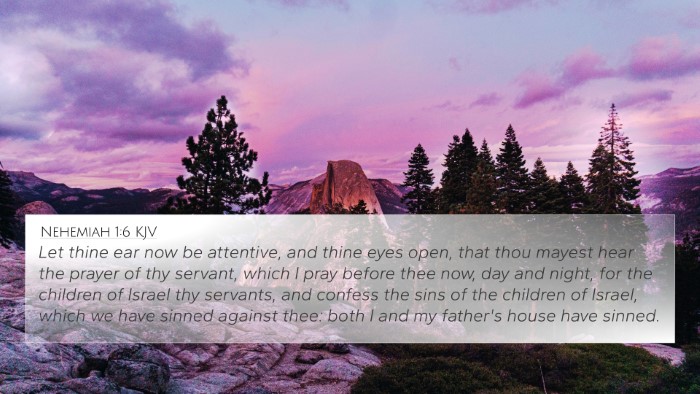Understanding Psalms 130:2
Psalms 130:2 states, "Lord, hear my voice: let thine ears be attentive to the voice of my supplications." This verse expresses a profound plea for divine attention and mercy during times of need. Below, we explore the meaning of this verse through the insights of public domain commentaries including those of Matthew Henry, Albert Barnes, and Adam Clarke.
Interpretation Overview
This verse highlights the deeply personal relationship between the psalmist and God. The longing for God’s ear suggests a recognition of vulnerability and desperation. The psalmist is not merely asking for any response, but specifically a response to their supplications—those earnest requests for mercy and intervention.
Commentary Insights
Matthew Henry
According to Matthew Henry, this verse underscores the importance of prayer in times of trouble. He argues that the psalmist acknowledges God's omnipresence and benevolence as a source of hope. The earnestness of the cry illustrates the nature of sincere prayer, which Henry sees as vital for obtaining mercy.
Albert Barnes
Albert Barnes emphasizes that this verse conveys a sense of urgency. He notes that the plea for God's attention signifies a strong reliance on divine help. Barnes argues that the psalmist's supplication is indicative of a humble heart that recognizes its own limitations and the need for God's intervention.
Adam Clarke
In Clarke's analysis, he points out the poetic qualities of the verse, highlighting the deep emotional appeal inherent in the language used. Clarke explains that the psalmist is not only requesting help but is also engaged in an intimate dialogue with God. This personal plea reflects the trust that the psalmist has in God's compassionate nature.
Bible Verse Cross-References
- 1 John 5:14: "And this is the confidence that we have in him, that, if we ask any thing according to his will, he heareth us."
- James 5:16: "The effectual fervent prayer of a righteous man Availeth much."
- Psalm 34:17: "The righteous cry, and the Lord heareth, and delivereth them out of all their troubles."
- Jeremiah 29:12: "Then shall ye call upon me, and ye shall go and pray unto me, and I will hearken unto you."
- Matthew 7:7: "Ask, and it shall be given you; seek, and ye shall find; knock, and it shall be opened unto you."
- Psalm 145:18: "The Lord is nigh unto all them that call upon him, to all that call upon him in truth."
- Isaiah 30:19: "For the people shall dwell in Zion at Jerusalem: thou shalt weep no more: he will be very gracious unto thee at the voice of thy cry; when he shall hear it, he will answer thee."
Relations to Other Scriptures
Psalms 130:2 is interconnected with various themes present throughout the Bible. Here, we explore some of those connections:
Thematic Connections
- Human Need for Divine Intervention: The principle of humans calling upon God in distress is a common theme in scriptures (e.g., Exodus 2:23-25).
- The Confidence in Prayer: The assurance that God hears prayers, as noted in 1 Peter 3:12.
- Repentance and Forgiveness: The context of supplication often relates to seeking forgiveness (e.g., Luke 18:13).
Cross-Referencing Bible Study
To fully grasp the significance of Psalms 130:2, one can utilize tools for Bible cross-referencing, incorporating a variety of methods to explore connections between it and other scriptures. Using a Bible concordance can be invaluable for identifying where similar themes are presented in the Bible. Furthermore, Bible chain references can aid in tracking these thematic links across both Testaments.
Conclusion
In conclusion, Psalms 130:2 is a rich text that embodies the essence of prayer, humility, and the quest for divine assistance. By utilizing comparative Bible verse analysis through public domain commentaries, individuals can deepen their understanding of this verse and its broader scriptural context. Exploring cross-references allows for a more comprehensive view of how such themes are interwoven throughout biblical texts, facilitating a deeper spiritual connection and understanding.
Further Study
For those interested in studying the relationships between various Bible verses, employing a bible cross-reference guide will enhance your understanding of scriptural dialogue and thematic connections. It opens a pathway for further exploration of the relational dynamics between different Biblical authors and their messages, forming a holistic view of scriptural teachings.














